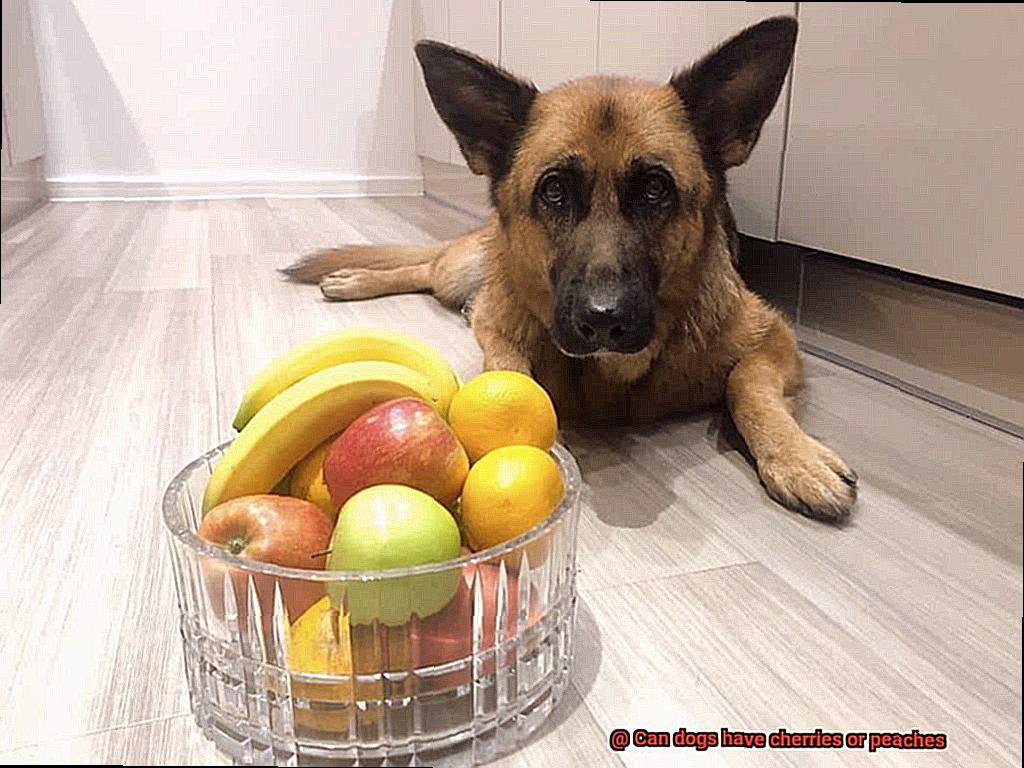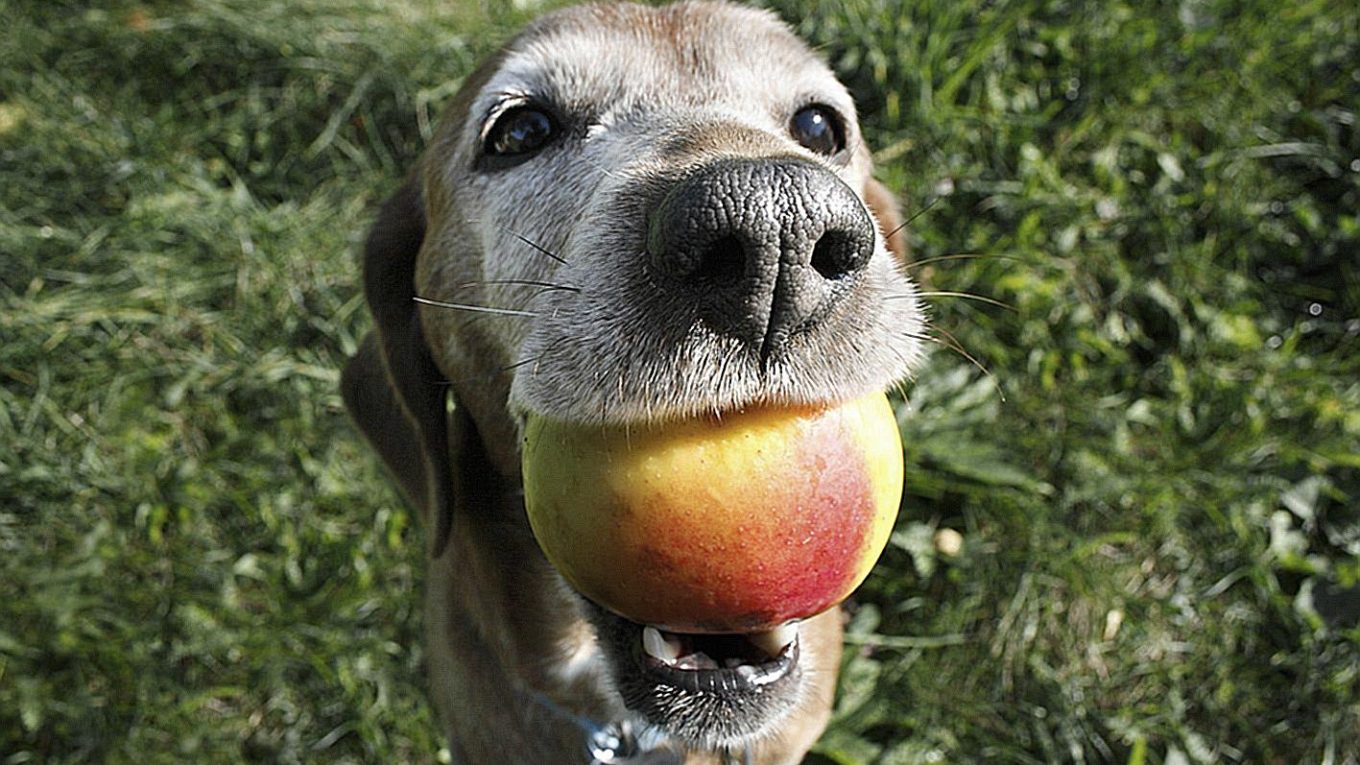Can dogs have cherries or peaches?
Ever wondered if your furry friend can enjoy the same tasty treats as you? Well, today we’re diving into the juicy world of cherries and peaches to uncover whether these fruits are a go or a no for our beloved dogs.
Cherries and peaches might seem like the perfect summer snacks for our four-legged pals. They’re packed with vitamins and antioxidants that make our taste buds dance. But hold your horses before you toss them a slice. There’s more to these fruity delights than meets the eye.
Let’s dig in and find out if cherries and peaches should be on your dog’s menu.
Can dogs have cherries or peaches?
Contents
- 1 Can dogs have cherries or peaches?
- 2 What Are the Benefits of Feeding Dogs Cherries?
- 3 What Are the Risks of Feeding Dogs Cherries?
- 4 How to Safely Feed Dogs Cherries
- 5 What Are the Benefits of Feeding Dogs Peaches?
- 6 What Are the Risks of Feeding Dogs Peaches?
- 7 How to Safely Feed Dogs Peaches
- 8 Signs and Symptoms of Cyanide Poisoning in Dogs
- 9 Consulting a Veterinarian for Advice on Fruits for Your Dog
- 10 Conclusion
The Cherry Conundrum:
Those little bursts of tangy-sweet goodness that we can’t resist. They’re full of antioxidants, vitamins A and C, fiber, and all sorts of good stuff. But here’s the catch – they come with some potential risks for our furry friends.
First off, cherries are pretty high in sugar. And just like us humans, dogs can suffer from weight gain, dental issues, and even diabetes if they consume too much sugar. Not to mention those pesky pits. They’re toxic and could be a choking hazard for your pup. Oh, and did I mention that stems and leaves contain cyanide? Yikes.
Peach Peril:
Picture this: biting into a juicy peach on a hot summer day. Pure bliss. But when it comes to dogs, we need to tread carefully.
Those peach pits are troublemakers. If swallowed by your pooch, they could cause serious blockages in their intestines – not fun at all. And just like cherries, peach pits also contain cyanide (definitely not something you want your furry friend ingesting). Plus, the fuzzy skin might cause tummy troubles for some pups.
Professional Opinion:
While cherries and peaches have their fair share of nutrients, the risks involved make it hard to give them a green light in your dog’s diet. But don’t worry. There are plenty of other safe and delicious treats out there that your pup can enjoy without any worries.
Stay tuned as we explore some healthier alternatives that will keep those tails wagging and those taste buds satisfied. Until then, let’s keep our furry friends safe and stick to the treats that we know are dog-approved.
What Are the Benefits of Feeding Dogs Cherries?
In particular, cherries are not only a delightful summer treat for humans but can also provide several benefits for our canine companions. In this article, we will explore the advantages of feeding cherries to dogs, focusing specifically on French Bulldogs, while also highlighting important considerations to ensure their safety and well-being.
Nutritional Powerhouse:
Cherries are packed with essential vitamins and minerals that contribute to a dog’s overall health. Rich in vitamin C, potassium, and fiber, they support immune function, promote proper heart and muscle function, and aid in digestion. Additionally, the antioxidants found in cherries can help combat free radicals and reduce the risk of chronic diseases.
Natural Anti-Inflammatory Properties:
French Bulldogs, like many other breeds, are prone to joint issues such as arthritis. Cherries contain natural anti-inflammatory compounds that can help alleviate pain and discomfort associated with these conditions. By incorporating cherries into your Frenchie’s diet, you may witness improved mobility and enhanced quality of life.
Digestive Health:
The fiber content in cherries promotes healthy digestion by aiding in regular bowel movements and preventing constipation. This is especially beneficial for French Bulldogs who may have sensitive stomachs or be prone to gastrointestinal issues.
Cancer Prevention:
Cherries possess natural anti-cancer properties due to their high concentration of antioxidants and phytochemicals. Regular consumption of cherries can help protect your French Bulldog against the development of cancer cells, contributing to their long-term well-being.
Skin and Coat Health:
French Bulldogs are known for their distinctive coat, which requires proper care to maintain its luster. The vitamins and antioxidants present in cherries can improve skin health and promote a shiny, healthy coat. Additionally, the anti-inflammatory properties may help alleviate skin irritations and reduce itching.
Weight Management:
Maintaining a healthy weight is crucial for French Bulldogs to prevent obesity-related health issues. Cherries are a low-calorie fruit, making them a guilt-free treat option for dogs that need to watch their weight. However, moderation is key to avoid overconsumption of sugar, which can lead to weight gain.
Important Considerations:
While cherries offer numerous benefits, it is crucial to exercise caution and follow these guidelines:
What Are the Risks of Feeding Dogs Cherries?
While cherries may seem like a delicious and nutritious treat, it’s important to be aware of the potential risks they pose to our beloved French Bulldogs. In this blog post, we will delve into the dangers associated with feeding cherries to your furry companion and why it’s crucial to exercise caution when it comes to their diet.
Cyanide Poisoning:
Cherries contain cyanide, a toxic substance that can be harmful to dogs in large quantities. This compound is primarily found in the seeds, stems, and leaves of the cherry fruit. If ingested, cyanide can lead to severe symptoms such as difficulty breathing, dilated pupils, bright red gums, shock, and in extreme cases, even death.
Gastrointestinal Blockages:
Even if your French Bulldog manages to swallow a cherry pit whole without breaking it open, there is still a risk of gastrointestinal blockage. The pit can get lodged in their digestive system, causing discomfort and potentially requiring surgical intervention.
Allergic Reactions:
Just like humans, dogs can develop allergies to certain foods, including cherries. Some dogs may exhibit symptoms such as itching, hives, swelling, or difficulty breathing after consuming cherries. If you notice any signs of an allergic reaction in your French Bulldog, it’s best to avoid feeding them cherries altogether.
High Sugar Content:
Cherries are naturally high in sugar content. Regular consumption or large amounts of cherries can lead to weight gain and dental problems in dogs. If your French Bulldog has pre-existing health conditions such as diabetes or obesity, it’s important to steer clear of cherries due to their potential negative impact on their overall well-being.
How to Safely Feed Dogs Cherries
While cherries can be a delicious and nutritious snack for humans, it’s essential to understand how to safely feed them to your French Bulldog. In this article, we will discuss the importance of removing pits and stems, monitoring for allergies or sensitivities, and consulting with a veterinarian before introducing cherries into your dog’s diet.
Remove Pits and Stems:
When feeding cherries to your French Bulldog, always remove the pits and stems. These parts can pose a choking hazard or cause digestive issues. Cherry pits also contain cyanide, which is toxic to dogs in large quantities. To ensure safety, cut the cherries in half and remove the pit with a knife or cherry pitter.
Moderate Serving Size:
Dogs should only be given cherries in moderation. Too many cherries can cause stomach upset and diarrhea in dogs. Start by giving your French Bulldog one or two cherries and observe their reaction. If they tolerate it well, you can gradually increase the amount over time.
Allergies and Sensitivities:
Just like humans, dogs can have allergies or sensitivities to certain foods, including cherries. Before introducing cherries into your French Bulldog’s diet, consult with a veterinarian to ensure they don’t have any underlying health conditions or allergies that could be worsened by consuming cherries. Monitor your dog for any adverse reactions such as diarrhea or upset stomach.
Fresh Cherries Only:

Stick to feeding your French Bulldog fresh cherries. Canned or preserved cherries often contain added sugars and artificial ingredients that are not healthy for dogs. Fresh cherries provide essential vitamins and antioxidants without any unnecessary additives.
Variety of Treats:
Remember that cherries should only be given as an occasional treat and not as a substitute for a balanced diet. While cherries can be enjoyed by dogs, it’s crucial to provide a variety of treats to ensure nutritional balance. Consult with your veterinarian to determine the appropriate treat options for your French Bulldog.
What Are the Benefits of Feeding Dogs Peaches?
French Bulldogs are known for their adorable wrinkly faces and playful personalities. As a French Bulldog owner, you want to ensure that your furry friend stays healthy and happy. Did you know that feeding peaches to your French Bulldog can provide them with some paw-some benefits? Let’s take a closer look at why peaches can be a peachy addition to your Frenchie’s diet.
Vitamins A and C – Boosting Immunity and Skin Health
Peaches are packed with essential vitamins A and C. These vitamins are not only important for us humans but also for our four-legged friends. Vitamin A can help boost your French Bulldog’s immune system, keeping them protected against illness and infections. Vitamin C promotes healthy skin and coat, which is especially important for French Bulldogs who may have sensitive skin.
Fiber – Happy Tummies
French Bulldogs are notorious for having sensitive tummies. Feeding them peaches can help regulate their digestion and keep their tummies happy. The high fiber content in peaches aids in digestion and prevents common gastrointestinal issues like constipation or diarrhea.
Antioxidants – Fighting Free Radicals
Peaches are rich in antioxidants, such as beta-carotene and lutein. These antioxidants help fight against harmful free radicals in your Frenchie’s body. By reducing oxidative stress, antioxidants can help lower the risk of chronic diseases and promote overall health and wellbeing.
Hydration – Quenching Thirst
French Bulldogs are prone to overheating due to their brachycephalic (flat-faced) anatomy. Keeping them hydrated is crucial, especially during hot summer months. Feeding your Frenchie peaches can provide them with hydration due to the fruit’s high water content. It’s like giving them a juicy treat that helps quench their thirst.

But wait, before you start feeding your French Bulldog peaches, there are a few things you need to know to ensure their safety and health.
- Remove the pit and skin: The peach pit contains cyanide, which is toxic to dogs if ingested. Make sure to remove the pit and any skin before offering a peach treat to your Frenchie.
- Moderation is key: While peaches offer many benefits, too much of a good thing can lead to an upset tummy or diarrhea. Introduce peaches gradually into your Frenchie’s diet and monitor their reaction.
- Consult with your veterinarian: Every dog is unique, and what works for one may not work for another. It’s always best to consult with your veterinarian before making any changes to your Frenchie’s diet. They can provide personalized guidance based on your dog’s specific needs and health conditions.
What Are the Risks of Feeding Dogs Peaches?
French Bulldogs are known for their adorable squishy faces and playful personalities. As a responsible Frenchie parent, you want to provide them with a balanced and nutritious diet. But what about peaches? While peaches can offer some health benefits, it’s important to be aware of the potential risks associated with feeding them to your furry friend.
The Danger of Peach Pits:
Peach pits contain amygdalin, which can break down into cyanide when ingested. Cyanide is toxic to dogs, and even a small amount can be harmful. It’s crucial to remove the pit before offering peaches to your French Bulldog to eliminate the risk of cyanide poisoning. Remember, prevention is better than cure.
Choking Hazards:
The size and hardness of peach pits pose a choking hazard for dogs, including French Bulldogs. If swallowed whole, it can become lodged in their throat or obstruct their digestive tract, requiring immediate medical attention. Always ensure that the peach pit is completely removed and dispose of it safely.
Excessive Sugar Content:
While dogs can tolerate some sugar in their diet, excessive consumption can lead to weight gain, dental problems, and even diabetes. Peaches have a relatively high sugar content, so it’s important to feed them in moderation as an occasional treat rather than a regular part of their diet.
Potential Allergic Reactions:
Just like humans, dogs can have allergies too. Some French Bulldogs may be allergic to peaches, resulting in itching, swelling, hives, vomiting, or diarrhea. If your Frenchie shows any signs of an allergic reaction after eating peaches, it’s best to avoid giving them this fruit in the future.
Preparation and Serving Risks:
Canned peaches often contain added sugars or preservatives that can be harmful to dogs. Additionally, any spices or seasonings used on the peaches should be avoided. Stick to fresh, ripe peaches without any added ingredients or seasonings.
How to Safely Feed Dogs Peaches
Imagine the sweet, juicy taste of a ripe peach on a warm summer day. As humans, we love this delicious fruit, but can our furry friends, like French Bulldogs, safely enjoy peaches too? The answer is yes. However, there are a few precautions to keep in mind to ensure your pup stays safe and healthy. In this article, we will explore how to safely feed peaches to French Bulldogs, from removing the pit to monitoring for allergies.
Remove the Pit: Protecting Your Pup’s Tummy
Before offering your French Bulldog a peach, it’s essential to remove the pit. Peach pits contain a compound called amygdalin, which can be toxic to dogs. To prevent any potential harm, make sure to take out the pit and any surrounding flesh before giving peaches to your dog. Safety first.
Wash Thoroughly: A Clean Bite for Your Frenchie
Just like any other fruit, peaches may have residual pesticides or bacteria on their skin. To avoid any health risks for your French Bulldog, always wash the peach thoroughly before feeding it to them. By doing so, you’ll remove any potential contaminants and ensure a clean and safe treat for your pup.
Start Small: Introducing Peaches Gradually
Dogs have sensitive stomachs, so sudden dietary changes can lead to digestive upset. When introducing peaches to your French Bulldog’s diet, start with small amounts. Begin by giving them a tiny piece of peach and observe how they react. If there are no adverse effects such as vomiting or diarrhea, you can gradually increase the portion size. Taking it slow ensures a happy tummy.
Watch for Allergic Reactions: Pup’s Health Comes First
Just like humans, dogs can have allergies too. Some French Bulldogs may have an allergic reaction to peaches. Keep a close eye on your furry friend for signs such as itching, redness, swelling, or gastrointestinal issues. If you notice any of these symptoms, discontinue feeding peaches and consult with your veterinarian. Your pup’s health and well-being always come first.
Moderation is Key: Treat, Don’t Overindulge
While peaches are generally safe for French Bulldogs in moderation, it’s important to remember that they should be given as an occasional treat. Peaches are naturally sweet and contain natural sugars that can contribute to weight gain or dental issues if consumed in excess. Keep the portion sizes small and remember that variety is key in maintaining a balanced diet for your pup.
Signs and Symptoms of Cyanide Poisoning in Dogs
Is your furry friend feeling a little under the weather? While we all love treating our French Bulldogs to delicious fruits like cherries and peaches, it’s important to be aware of the potential risks they can pose. Cyanide poisoning can occur if dogs consume the seeds, pits, or leaves of these fruits. To ensure the well-being of your beloved pup, it’s crucial to recognize the signs and symptoms of cyanide poisoning. Here’s what you need to know:
- Difficulty Breathing: One of the most common signs of cyanide poisoning in dogs is difficulty breathing. Cyanide interferes with the body’s ability to use oxygen, leading to respiratory distress. Keep an eye out for rapid or shallow breathing, excessive panting, or gasping for breath. If your French Bulldog seems to be struggling with their breath, it’s time to seek immediate veterinary care.
- Cherry Red Gums and Tongue: Cyanide poisoning can cause a condition called cyanosis, where the body’s tissues don’t receive enough oxygen and turn a bluish-red color. This discoloration is particularly noticeable in the gums and tongue of affected dogs. So, if you notice that your Frenchie’s gums and tongue have turned a cherry red shade, it’s a strong indication of cyanide poisoning.
- Vomiting and Diarrhea: Another symptom to watch out for is vomiting and diarrhea. Cyanide irritates the gastrointestinal tract, leading to nausea, vomiting, and loose stools. The vomit or stool may contain blood or have a distinctive odor. If your furry friend is experiencing these symptoms after consuming cherries or peaches, it’s essential to act swiftly.
- Seizures or Loss of Consciousness: In severe cases of cyanide poisoning, dogs may experience seizures or even lose consciousness. These neurological symptoms occur due to the lack of oxygen reaching the brain. If your French Bulldog exhibits these signs, don’t waste any time – rush them to the veterinarian immediately.
- Other Symptoms: In addition to the aforementioned signs, other symptoms of cyanide poisoning in dogs may include anxiety or restlessness, an increased heart rate, and a distinct almond-like odor on their breath. Keep an eye out for these indicators, as they can vary depending on the severity of the poisoning and your dog’s response.
Remember, if you suspect that your French Bulldog has ingested cherries or peaches and is displaying any signs of cyanide poisoning, it’s crucial to contact your veterinarian without delay. Time is of the essence when it comes to treating cyanide poisoning, and prompt medical intervention can be life-saving for your furry friend.
Consulting a Veterinarian for Advice on Fruits for Your Dog
While fruits can offer nutritional benefits to dogs, it is important to consult a veterinarian before introducing them into your French Bulldog’s diet. In this blog post, we will explore the importance of seeking professional advice when selecting fruits for your furry friend.
Expert Knowledge and Guidance:
Veterinarians possess in-depth knowledge and expertise in animal nutrition. They can provide personalized guidance based on your French Bulldog’s breed, age, size, and overall health condition. Their recommendations can help you make informed decisions regarding fruit selection for your furry companion.
Ensuring Safety:
Certain fruits may be harmful or cause digestive issues for dogs. By consulting a veterinarian, you can prevent potential risks associated with fruits that may not be suitable for French Bulldogs. For instance, grapes and raisins can cause kidney failure in dogs, while avocados contain persin, a substance toxic to canines.
Determining Portion Sizes and Frequency:
Veterinarians can advise on the appropriate portion sizes and frequency of fruit consumption for your French Bulldog. Just like humans, dogs need a balanced diet, and excessive fruit intake can lead to weight gain or other health issues. Your veterinarian can guide you on the right amount of fruit to include in your dog’s diet.
Identifying Beneficial Fruits:
While certain fruits pose risks, others can be beneficial for French Bulldogs. For example, blueberries are packed with antioxidants that support the immune system, while apples provide fiber and promote dental health. Your veterinarian can recommend fruits that offer nutritional benefits without compromising your dog’s well-being.
Consulting a veterinarian is essential when selecting fruits for your French Bulldog’s diet. They possess the knowledge and expertise to guide you on safe and suitable fruit choices, portion sizes, and frequency of consumption. By seeking professional advice, you can ensure your beloved French Bulldog enjoys a healthy and balanced diet, promoting their overall well-being.
S1xnWxBQ4PM” >
Conclusion
In conclusion, it is important to remember that cherries and peaches can pose a potential risk to our furry friends.
The pits of these fruits contain cyanide, which is toxic to dogs. Even though the flesh itself may not be harmful, the risk of choking or intestinal blockage from swallowing the pit is too great.
Furthermore, the high sugar content in cherries and peaches can lead to weight gain and other health issues in dogs. Therefore, it is best to err on the side of caution and avoid giving these fruits to our canine companions.
Instead, opt for dog-friendly alternatives like apples or blueberries that provide similar nutritional benefits without the potential dangers.




